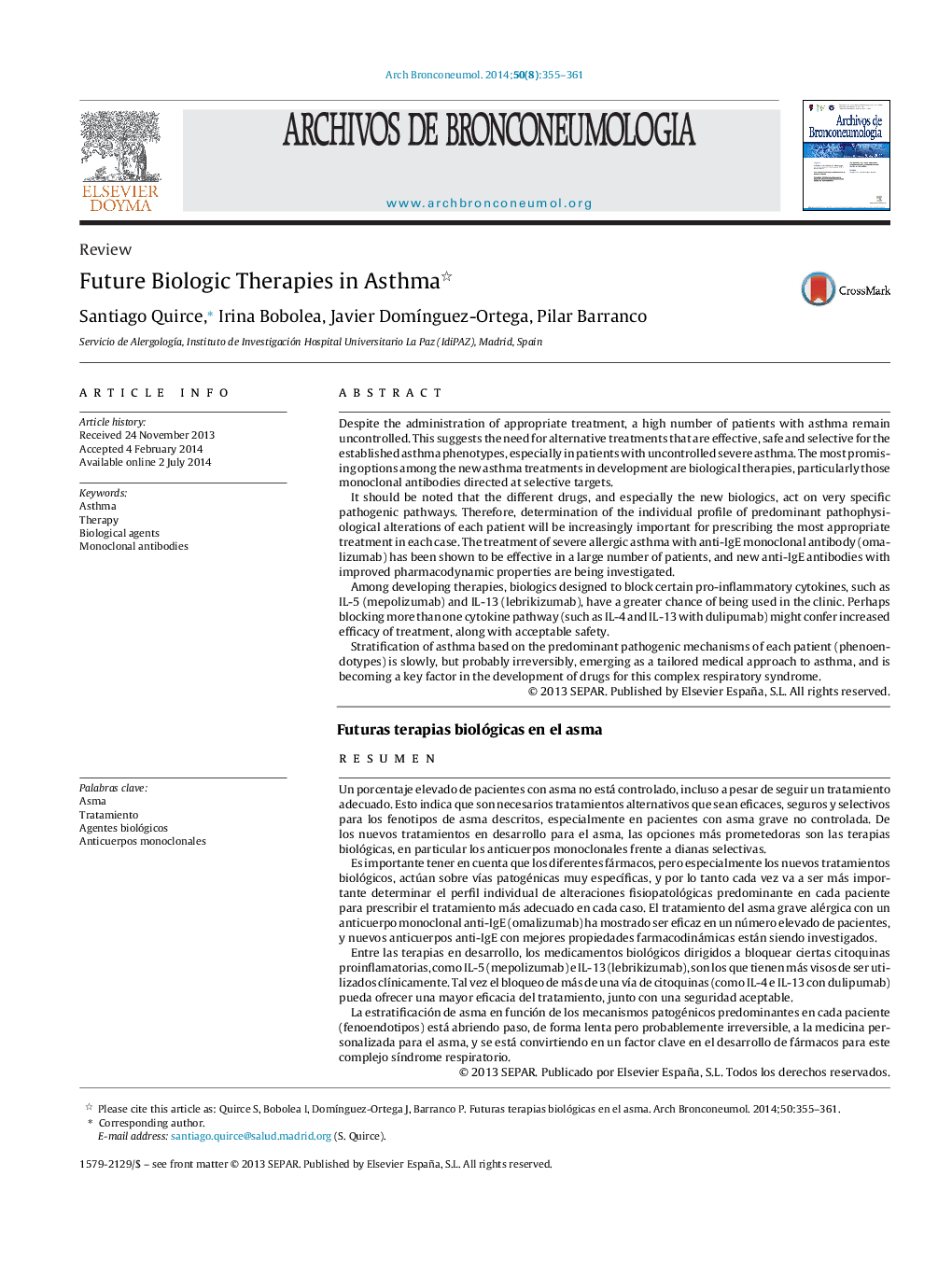| کد مقاله | کد نشریه | سال انتشار | مقاله انگلیسی | نسخه تمام متن |
|---|---|---|---|---|
| 4205549 | 1279916 | 2014 | 7 صفحه PDF | دانلود رایگان |
Despite the administration of appropriate treatment, a high number of patients with asthma remain uncontrolled. This suggests the need for alternative treatments that are effective, safe and selective for the established asthma phenotypes, especially in patients with uncontrolled severe asthma. The most promising options among the new asthma treatments in development are biological therapies, particularly those monoclonal antibodies directed at selective targets.It should be noted that the different drugs, and especially the new biologics, act on very specific pathogenic pathways. Therefore, determination of the individual profile of predominant pathophysiological alterations of each patient will be increasingly important for prescribing the most appropriate treatment in each case. The treatment of severe allergic asthma with anti-IgE monoclonal antibody (omalizumab) has been shown to be effective in a large number of patients, and new anti-IgE antibodies with improved pharmacodynamic properties are being investigated.Among developing therapies, biologics designed to block certain pro-inflammatory cytokines, such as IL-5 (mepolizumab) and IL-13 (lebrikizumab), have a greater chance of being used in the clinic. Perhaps blocking more than one cytokine pathway (such as IL-4 and IL-13 with dulipumab) might confer increased efficacy of treatment, along with acceptable safety.Stratification of asthma based on the predominant pathogenic mechanisms of each patient (phenoendotypes) is slowly, but probably irreversibly, emerging as a tailored medical approach to asthma, and is becoming a key factor in the development of drugs for this complex respiratory syndrome.
ResumenUn porcentaje elevado de pacientes con asma no está controlado, incluso a pesar de seguir un tratamiento adecuado. Esto indica que son necesarios tratamientos alternativos que sean eficaces, seguros y selectivos para los fenotipos de asma descritos, especialmente en pacientes con asma grave no controlada. De los nuevos tratamientos en desarrollo para el asma, las opciones más prometedoras son las terapias biológicas, en particular los anticuerpos monoclonales frente a dianas selectivas.Es importante tener en cuenta que los diferentes fármacos, pero especialmente los nuevos tratamientos biológicos, actúan sobre vías patogénicas muy específicas, y por lo tanto cada vez va a ser más importante determinar el perfil individual de alteraciones fisiopatológicas predominante en cada paciente para prescribir el tratamiento más adecuado en cada caso. El tratamiento del asma grave alérgica con un anticuerpo monoclonal anti-IgE (omalizumab) ha mostrado ser eficaz en un número elevado de pacientes, y nuevos anticuerpos anti-IgE con mejores propiedades farmacodinámicas están siendo investigados.Entre las terapias en desarrollo, los medicamentos biológicos dirigidos a bloquear ciertas citoquinas proinflamatorias, como IL-5 (mepolizumab) e IL-13 (lebrikizumab), son los que tienen más visos de ser utilizados clínicamente. Tal vez el bloqueo de más de una vía de citoquinas (como IL-4 e IL-13 con dulipumab) pueda ofrecer una mayor eficacia del tratamiento, junto con una seguridad aceptable.La estratificación de asma en función de los mecanismos patogénicos predominantes en cada paciente (fenoendotipos) está abriendo paso, de forma lenta pero probablemente irreversible, a la medicina personalizada para el asma, y se está convirtiendo en un factor clave en el desarrollo de fármacos para este complejo síndrome respiratorio.
Journal: Archivos de Bronconeumología (English Edition) - Volume 50, Issue 8, August 2014, Pages 355–361
